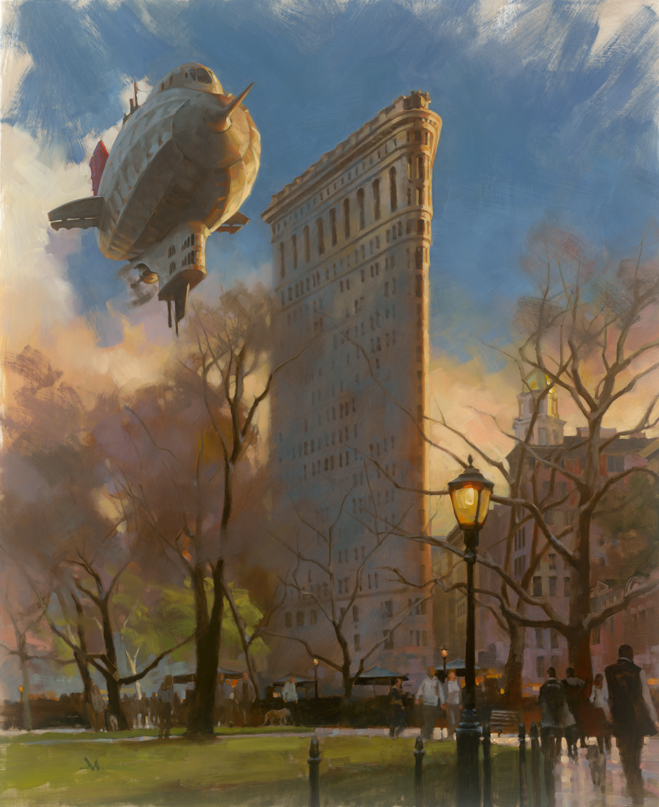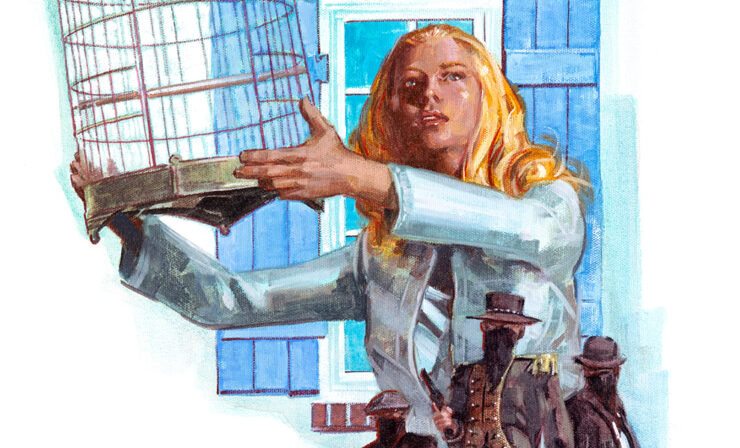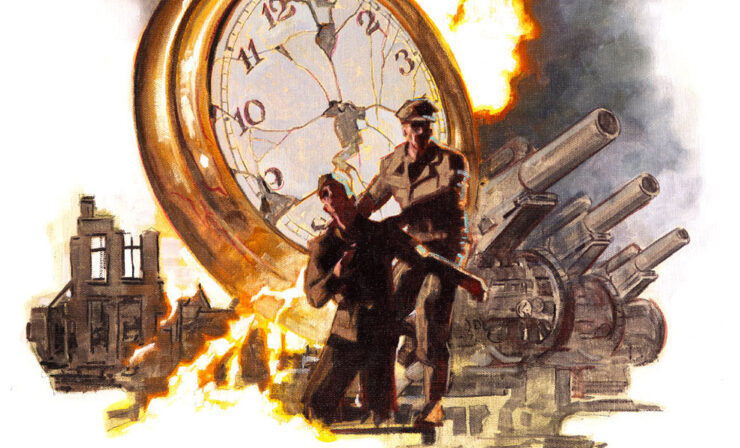As Tor.com departs from its longtime home, the iconic Flatiron building, we present this sweet farewell from Seanan McGuire.
New York City spreads out beneath us, gray steel and gleaming glass from our aerial perspective, virtually stripped of the color and chaos that almost always fills its streets, and everything about it is familiar, and nothing about it is familiar, and I am so very far away from home.
I’m tired of this. They warned me when I started that one day I’d be tired of this, and I thought they were ranting and raving the way hidebound old fools always rant and rave when there’s a scientific advancement at hand—it’s as much a part of the process as the grandiose declarations of showing them, showing them all, and the ceremonial passing of the adventurer’s compass. Turns out they were right. There are only so many wonders you can see before you start thinking longingly of your own bed in your own room in your own home, of the pillows battered into the shape of your head, the mattress that knows every curve of your body better than a lover ever could, the heater that rattles in that way that turned into white noise years ago, unremarkable, soothing, memorable only in its absence.
I don’t think I’ve had a decent night’s sleep in five years, and I still have two more to go, and I hate this.
“Helm, report.”
My current helmsman is a green-skinned nymph from a parallel where the gods of the Greeks never faded from power. Instead, they continued doing what they did best—fighting, fucking, and feasting—until ninety percent of the population could trace their lineage directly back to one god, demigod, or mythical figure or another. Not that they called them “myths,” since, y’know, when you’re one of the eleven million families whose Solstice dinners Zeus is required to drop in on, the situation isn’t very mythical anymore. She looks up, nods once, and goes back to studying her instruments.
“Mammalian,” she says finally. “There are representatives of other populations, but they’re all at what we expect from the human-dominated Manhattans. The avian clusters match my pigeon data, and the insects match up with cockroaches. Mostly. There are a few outliers.”
“Are the mammals moving slowly and with confidence, or are they cowering in the subway tunnels?” We once found a parallel where the pigeons had somehow turned carnivorous and bloodthirsty. A flock could pick the flesh off a human’s bones in under a minute, the piranhas of the sky.
We lost two interns on that stop, and we didn’t even manage to collect any of the flesh-ripper pigeons. Which is a much bigger pity. No one signs on as an intern for a trip like this one unless they have a massive death wish or a family that’s desperately in need of the survivor’s benefits. It’s sad and it’s tragic and it’s the reason we have such a high death toll every time we cruise the parallels. Everyone needs to get by. Flesh-ripper pigeons, though…
Those would have given the rest of us a reason to turn around and head for home, finally in possession of something bigger and better than the little trinkets we’ve been picking up since day one. Still, a hold of trinkets is nothing to sneer at. Stubby isn’t the biggest or fastest or shiniest airship in the fleet, but she gets the job done.
“Mammals are within median human standards—this looks like a boring one—and they’re out on the streets in pretty large numbers. They seem to be alive, so we’re not dealing with a reanimating pathogen.”
“Thank the Lightning for that,” I say.
The rest of the bridge crew offer their own counterpoints, varied by their parallels of origin. The ones who’ve been with me since the beginning thank the Lightning, and the two we picked up in that weird theologically inverted parallel thank the Thunder, while Daphne—my helmsman—thanks her father, Zeus, in a bright, chipper voice that makes me thankful, once again, that we haven’t encountered him anywhere outside the parallel where we picked her up. The last thing I need right now is a randy deity showing up on my bridge, especially since he might not recognize Daphne as his daughter.
“Captain?”
I turn. Our navigator is looking over his shoulder at me. Well. One of his heads is. The other is still watching the curved window that makes up the front of our airship, crystal clear and apparently fragile. Most people who attack us aim for that window first, not asking themselves how many protections we’d put on a sheet of glass that size. The fact that it’s not a solid mass of bugs doesn’t seem to be the clue it should.
“What is it?”
He smiles uncertainly. “I think I see the Flatiron.”
That makes me stand a little straighter. Not every parallel has a Flatiron Building. Oh, every one we’ve discovered where the European colonists constructed a settlement in the area we know as “Manhattan” has had plans for a Flatiron Building, but they don’t always get built, and once they’re built, they don’t always survive. Some of them have burnt. Others were bombed. One of them was infected by an artificial bacterium intended to help destroy landfills by converting them into arable soil, which had converted it into the largest pile of loam I’d ever seen. An intact Flatiron is reason to celebrate.
Maybe. “How secure does the structure look?”
“Seems stable.”
That’s… good. “Is there a docking station on the roof?”
“Negative, captain.” Daphne looks up from her instruments. “The mammals below us are pointing and stopping as we pass overhead. I don’t think the airship caught on in this parallel.”
“Oh, lovely. Primitives.”
“There are flying machines,” says one of the other bridge crew. “They seem to operate on an internal combustion basis, but they get where they’re going. Fast, too. If we had one of those, we’d be home within the quarter.”
“With our surveys half-finished,” I snap. “You can’t chart ground properly if you’re moving across it too fast for anything to record. Use your head, or we’ll get you a new one.”
“I’d like a new head,” says the navigator. “The ones I have don’t provide me with a full range of vision. Three heads, now. Three heads is where it’s at.”
I manage, barely, not to throw my hands up in the air. “I’m going belowdecks,” I say. “It’s time to prep the incursion team.”
“Aye, aye, Captain,” shouts the helmsman. Everyone laughs.
I am so tired of this shit.
These are facts about the universe in which we live:
First, it’s basically a sheet of baklava that hasn’t been cut. Layer upon layer of reality, all resting lightly atop one another, all sweet and delicious and ready to be devoured. And trust me when I say there are things out there that are totally into the concept of devouring existence as we know it, one crunchy, nut-filled bite at a time. Worlds that aren’t watched have a tendency to blink into nothingness and be forgotten, filling the belly of some cosmic terror, creating yet another hole in the pastry. When a world gets eaten and a hole opens up, it’s easier for the baklava-eaters to shove their nasty little hands in and pry more pieces loose.
Maybe “your world is a tasty snack, good luck sleeping tonight” isn’t a good way to start a conversation, but I’m with the Cartography Corps, otherwise known as the Looters. Diplomacy is for people with a much higher pay grade than mine. Because…
Second, not every world knows they’re not alone, and better minds than mine figured out a long, long time ago that it’s best to let people figure things out in their own time. If one world opens a window on another, they view themselves as peaceful explorers. If a world has a window opened on it, they view the people on the other side as hostile invaders. Aren’t humans fun? I mean, to be fair, that sort of maps up to most of recorded history in the majority of the parallels we’ve charted, but still, it means we have to be careful when we’re surveying.
But it doesn’t mean we can stop.
The Cartography Corps is a joint venture by the governments of nine of the most advanced parallels. We have alliances with countless more. They send us resources, crewmen, and supplies, and we launch our airships into the vastness of the universe, charting and recording everything we encounter. We map the baklava, because we can’t tell when things are missing unless we know what’s supposed to be there. Despite my navigator’s fascination with internal combustion engines, they’re not suitable for our purposes: they go too fast, and our maps wind up with holes in them, empty places where the data ought to go. We travel by airship like civilized people, sailing across the endless sea of parallel worlds, making our lists and checking them twice, telling our archives who’s naughty or nice.
And of course there’s the looting. We’re not pirates, but we’re not saints either, and we’re almost always a long, long way from home, unless we find something that demands immediate attention from the scholars at the University. We gather trinkets and artifacts as we travel, along with raw materials, tucking them all away in our hold until we can’t carry any more and get to turn and head for home. We try never to take anything of specific social or religious significance. On parallels with a decently sized human population, we can sometimes even pay for what we abscond with.
Airship contact is inevitable, of course, but it’s never yet been a major concern. Some parallels fire on us, and that’s fine: if they don’t have the ability to move between layers of the baklava, they don’t have anything powerful enough to breach our shields. Other parallels try to worship us as gods, which is a little annoying for everyone except for Daphne, who takes it all in stride. Godhood is her family business, after all. Mostly people just give us what we ask for and try to forget us as quickly as possible.
Me and Stubby—my airship, Her Majesty’s Stalwart Trumpet of Glory—have been running the North American mapping routes since I left home, and part of our job is to drop in, verify the location of semi-universal landmarks, and see whether they have any artifacts in need of preservation. Hence our current course for the Flatiron Building, which is, as I mentioned, close enough to universal as to be a little bit unnerving. Why that building? Why that location? No one really knows, but wow are there a lot of them.
The scouts and rangers of the incursion team are, as always, completely at ease when I step into their shared quarters, a single large room that takes up most of our lower deck. They have free access to our hold, and most of them have “borrowed” various artifacts to decorate the space around their beds, hammocks, and sleeping tanks. The effect is not unlike stepping into a junk shop that had an unfortunate encounter with a hand grenade.
Heloise is playing some sort of dice-adjacent game with Tim and Tom, using precious gems in place of the dice. Alcestis, from Daphne’s world, is face-down in a hammock, snoring gently. The rest of the incursion team is nowhere to be seen, which worries me a little.
“Captain on the deck,” I call, voice pitched high and carrying.
They ignore me.
“Captain on the deck and carrying her dissection kit,” I call, and they snap to attention, Heloise snatching a diamond out of the air as it bounces back up toward her, Tim and Tom turning to face me, Alcestis rolling out of her hammock and landing in a heap on the floor.
These are the people with whom I have been instructed to preserve reality. I used to wonder why cartography captains only ever seem to want a single tour of duty. I don’t wonder anymore. Now I wonder how much the professors are going to bribe me to keep my mouth shut when I get home. I better be getting tenure and a letter from the queen granting me permission to raise the dead whenever I want to, or I’m going to single-handedly tank their enrollment numbers while I drink my way through every pub in New Amsterdam.
“Hoy, Captain,” says Heloise. She’s always been the fastest to recover. She’s died twice, and undergone two field resurrections, and she’s still as cheerful as the day she enlisted. “What’s the signal?”
“Human-occupied Manhattan, and we’re bound for a Flatiron Building,” I say. “We should be docking in no more than twenty minutes.”
Tim and Tom give a little cheer. Even Alcestis lifts one arm in the air, waving it around in a limp, desultory manner before she goes back to trying to peel herself off the floor. My crew. So exciting.
“We don’t know local customs, pathogens, or linguistics, so the first team will consist of the four of you. Try to avoid contact with the government, or causing any branch of law enforcement to be activated. You’re going to go inside, scout around, see whether we can get anything out of this parallel, and give our mapping systems time to chart the city. When I call you back, you come. Got it?”
“Yes, Captain,” they chorus dutifully. Anything to get off this ship and down into the city; anything to make them feel useful. They want to do the jobs they were recruited for. I can’t blame them for that. They have a tendency to cut a trail of chaos and confusion in their wake. I can blame them for that, and do, at every opportunity. But they’re the team I have, and replacements take time to train, assign, and arrive. Better to just work with what I have and hope they never cause a cross-parallel war.
Or that if they do, it’s a good one.
“We won’t let you down, Captain,” says Heloise, and she’s wrong; I know she’s wrong. But that doesn’t seem important, so I just smile, nod, and wave her toward the door.
The mapping systems have been running for the last hour, while the incursion team works their way deeper and deeper into the building, occasionally sending back brief transmissions that only Daphne understands. That means this is an English-dominant Manhattan: if we’d found another parallel where the Greeks conquered the world, they wouldn’t be using Greek as their semi-encoded messaging system.
Sometimes I think there must be a better way of doing this, or at least a more efficient one. Then I consider how many of our systems I can fix with a socket wrench and an electrical shock, and I remember why we do things in as primitive a manner as the job allows. The people on the ground can keep their bells and whistles. We’ll stay crude and we’ll stay in the air.
“Uh, Captain?”
I turn. Daphne looks… concerned. The expression is foreign on her normally jovial face. A shiver of worry races down my spine and curls in my gut. If we’ve lost the incursion team…
We won’t be the first and we won’t be the last, and they all knew the risks when they signed on for this trip. See the parallel worlds, experience wonders beyond imagining, and possibly get consumed by them, that’s the gig. I know that. I’ve always known that. They wouldn’t even be the first crew members I’ve had to leave behind, laid to rest in the soil of an unfamiliar world. But every death burns, and I don’t want to go through this again, no matter how routine the risks.
“Report,” I say.
“Uh, Alcestis says you need to come down to the Flatiron Building,” says Daphne, slow, uncertain. Confused. “She says there’s some question of the trade arrangements we need, and the locals want to meet you.”
I blink. “What?”
“Um, she also says the locals have offered to call security if you’d rather stay in the sky, since any real captain would come down and vouch for her crew.”
“Lightning.” I close my eyes for a moment. The swear isn’t big enough. I need real profanity for this. “Lightning and equipment failure.”
The navigator makes a startled choking noise. I open my eyes.
“Tell her I’ll be right down,” I say, and stride for the door to the release chute before anyone can argue with me or offer to take my place, to pretend to be captain while I sit safely in the sky, well away from mobs with pitchforks and torches. They risk themselves for me. The least I can do is return the favor.
The release chute is attached to the bottom of our ship, a clever construction of clear glass and metal bands forming an umbilicus tube that extends all the way to the roof of the Flatiron below. Aerodynamics have never been my field; I don’t understand how it harnesses the wind to slow our fall, or how it can tell the difference between a body it should drop and a body it should pull back into Stubby’s comfortable embrace. It does the job it was built for, and that’s enough for me. I step into the oval opening in the floor, and the wind catches me and pulls me down, like a drowning woman bound for the bottom of the sea.
But I’m not drowning. There’s air here, all around me, and through the glass walls of the chute, I can see this new Manhattan, familiar and strange at the same time, like something out of a very unsettling dream. Then the roof of the Flatiron Building is visible beneath me, and my incursion team standing around the vent structure for the building’s air supply. They’ve been joined by several people I don’t know. That’s… not excellent. We try to minimize interaction with the people native to the various parallels, for reasons ranging from “everyone has a different local flu” to “we find them vaguely unsettling.”
There’s nothing to be done for it now. I drop out of the chute onto the rooftop, straighten my jacket, and step forward, hand already extended for the polite, ceremonial confirmation that I’m not here to stab anyone. “Captain Isabelle Langford of Her Majesty’s Stalwart Trumpet of Glory, at your service,” I say. “My crew said you wanted to speak with me?”
One of the locals, a cadaverous man who looks like he’s already been killed and resurrected three or four times—so maybe these people are more civilized than they seem—is practically vibrating, smiling so broadly that he’s in danger of splitting his lower lip. “This is really happening, this is really, really happening,” he says. He turns to another of the locals, a shorter woman with graying hair and a politely bemused expression. “You owe me ten dollars.”
“I never made that bet,” says the woman. “Excuse me, ah, Captain, but are you saying these people really came from your, ah, airship up there? From another dimension?”
How much has the incursion team told these people? “Yes,” I say stiffly, lowering my hand. “We come in peace. We don’t intend you any harm.”
“Those two sentences mean the same thing, usually,” says the third local, a balding man who seems short next to the living cadaver, but is about the same height as most of the men in my crew. He has an Albian accent. It sounds weird here in a New Amsterdam cognate. He’s as out of place as we are. “Is there a reason you need to say both?”
“Is there a reason you needed to talk to me?” I counter. “I don’t leave the ship very often.”
“That was me,” says Alcestis, a twinkle in her eye that I don’t care for. “See, these nice folks thought we were fans who’d broken into their offices looking for one of their authors.” My confusion must show in my expression, because she grins and explains, “They publish fiction. Science fiction. Stories about airships and parallel dimensions and people from radically divergent timelines.”
“Oh sweet Lightning, we fell into one of those,” I mutter. I focus on our trio of locals, trying to smile, trying to look like I don’t want to push them all off the building and have done with it. “We can’t take you with us. Living samples are a violation of protocol.” I won’t tell them that we sometimes recruit new crewmembers from unexplored parallels. I don’t want the headache, and we don’t have any openings right now anyway.
“We already clarified that with Al, here,” says the cadaver, indicating Alcestis. “We were just hoping you’d sit down for coffee, let us take some notes, while your people explore the city. We’re even willing to tell the authorities that your ship is a promotional stunt we’re doing. Keep the lookie-loos away.”
“We’ll buy lunch,” says the woman. “For your whole crew.”
“All right,” I say slowly. “Do you have green people on this parallel?”
“No,” says the Albian man. “Why, do you?”
Slowly, I smile. Alcestis winks at me.
This is going to be fun.
We set sail for the nearest dimensional instability, a map of our assigned territory safely stored in the ship’s systems and several cases of the local literature in the hold, along with everything else the incursion team was able to liberate during their tour of the city. We’re almost ready to go home.
“Captain?” asks Daphne. She’s wearing a T-shirt from the book people. It’s not officially approved, but she looks good, and I like to let my. 2019 crew express themselves.
“Sail for the tear,” I say. “We have work to do.” And on we go, chasing the horizon, steam and chrome and lightning, drifting onward, ever onward, any way the wind blows.
“Any Way the Wind Blows” copyright © 2019 by Seanan McGuire.
Art copyright © 2019 by Gregory Manchess.















Aah, what a wonderful send-off. As always, you and your stories are a delight, Seanan. Thank you for writing this.
I love this, from the Manchess artwork all the way through.
I regret never having visited Tor whilst your offices were there, and now never can.
so I have bohemian rhapsody in my head as I read this
Ha! This is so lovely and so Seanan! Thank you!
Wow. I’m really going to miss the Tor-in-Flatiron days. This is a wonderful story. Thank you!
The artwork is great, and the story is great, but the airship in the artwork is clearly powered by internal combustion and not sails!
Hi
A lovely story and illustration. Thanks to Tor for supporting such a great resource for fans.
Guy
Great story, but sad news!
It’s dusty in here…and I’ve never even been there.
I’m a simple person. I see Seanan’s name, I click.
@6. Nope, says steam. That’s external combustion.
Lovely story. I love that the airship is nicknamed Stubby.
Awwwww.
And there should totally be a poster made from that artwork, which is gorgeous. I don’t buy posters, but I’d buy that one.
@3 – Funny, “These are the people with whom I have been instructed to preserve reality” reminded me of “Are these the men with which I am to defend America?” from Hamilton.
equipment failure!…..my new expletive!
This story can’t be in this New York; in this post-9/11 world, a mysterious zeppelin mysteriously showing up at 175 Fifth Avenue would result in the NYPD’s somewhat terrifying Emergency Services Unit showing up in very suspicious mood.
Also, I don’t remember much green space near our Flatiron Building.
Cute Great story, though.
LOL! Great story. I think the best line when is when Daphne-daughter-of-Zeus is described as having a “jovial” face. Very pleasant ride; thank you very much.
So, Stubby The Rocket is really an AIRSHIP? But not powered by an internal combustion engine, like all other (real) airships? But many thanks to Seanan McGuire for this charming story and Gregory Manchess for the illustration.
Adorable.
May your new home bring you only joy.
Freakin’brilliant. A bit of Long Earth a bit of SteamPunk, a bit of Rise… a lot of Seannan. Thanks!
Wonderful story.
What a fun tribute. Loved it.
Nice story
awesome picture
but seriously how can we order prints
What a sweet story! A bit flakey, and more than a few nuts, but I have a feeling it will stick with me for a long time.
Daaamn. Somehow, Seanan so-often writes exactly what I want to write read. And now I want more of that story. Grumble.
This was AWESOME! I really really hope you write more in this universe!
A fun read. :)